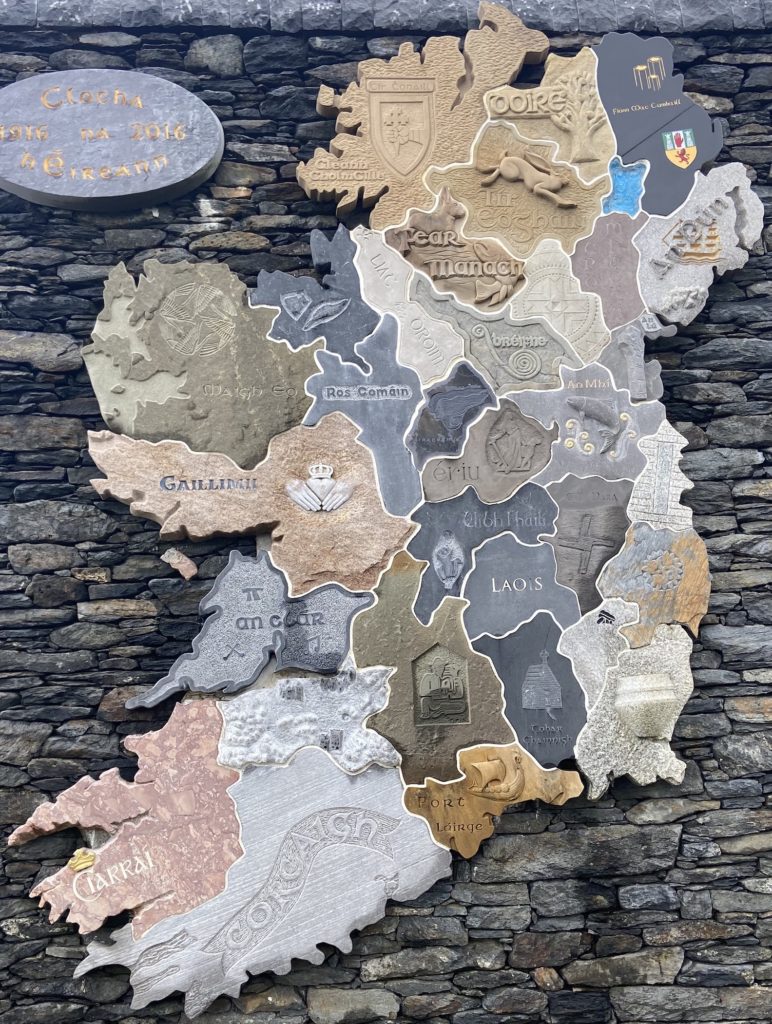In my time in Ireland I have gained a new perspective on what many people think about what Ireland will look like post-Brexit. The United Kingdom is now a non-EU country and Ireland is an EU country, and yet they share a controversial border. When the UK decided to leave the European Union, it quickly stoked fears about what would happen to the border between the 26 counties of the Republic of Ireland (ROI), and the 6 counties of Northern Ireland over which the UK exercises jurisdiction. When the two nations were both members of the EU, a soft border with free movement was the default, but with the UK’s departure, to preserve this status quo a special agreement must be crafted, yet currently no such lasting agreement has been accepted. To write an international agreement allowing an essentially unregulated border between a non-EU country and an EU country is quite a hard thing to accomplish, but neither nation is interested in going back to the hard border that divided Ireland during the decades-long sectarian violence during the second half of the 20th century- The Troubles.
Fear of a hard border was one of the issues that pushed the people of Northern Ireland to vote largely to remain in the EU. I haven’t encountered much discussion about the border itself since my coming to Donegal because it seems that virtually no one wants the island split again. What I have come across however, is diverse attitudes towards the EU and its relation to united Ireland, especially in light of the fact that the “Leave” campaign ultimately triumphed nationally. Independence talks have reignited in Scotland as well as Irish Reunification discussions in Northern Ireland since Brexit, since both were in favor of staying in the EU but were out voted by the much larger English (and Welsh) population. Something that has surprised me in discussions with the people here is that more often than not, nationalist united Ireland attitudes, and pro-EU attitudes go hand in hand. Because the Irish language has become associated with Irish nationalism in the North, many Irish language learners come from Belfast and Down who see Irish as an important aspect of their Irish identity in contrast to British unionism.
As an outsider this has always been confusing to me, because it sort of appears that folks want to get rid of English governance once and for all in Ireland and be free of London… so that the whole island can be subject to the decisions of Brussels. I believe that this favorable view of the EU has become so popular among Irish nationalists because it was the UK and ROI’s membership in the EU that assuaged some of the aforementioned divisions that have plagued the island since the War of Independence in 1922, when Ireland was first artificially bifurcated. If it is England’s desire to leave the EU and impose the threat of division on Ireland then of course the popular-in-Northern Ireland EU is going to be used as a selling point among nationalist politicians who want to reunite with an EU member state: the Republic of Ireland. I don’t think this joining of nationalism and Eurocentrism is a reflection of Irish people putting a great deal of value on being part of Europe, but instead it really reflects a strong sense of Irish identity which calls for a united Ireland, and harnessing pro-EU sentiment is a way to effect political change favorable to nationalist identity and policy. I have had a lot of exposure to this particular combination of thought because Irish speakers (and learners) tend to be very passionate about Irish identity and therefore to a significant extent fall on the pro-EU united Ireland side of the post-Brexit vision of Ireland discussion.
Another less common but still present strain of thought that I have come across is that of people who would traditionally be a demographic who associate with nationalist sentiments, but are Eurosceptic and don’t associate with the modern nationalist political leaders, Roman Catholic conservatives on both sides of the border. Because Irish is a struggling minority language, it is disproportionately used by an older demographic who come from small communities less focused on European politics. There is certainly a strain of Euroscepticism in this demographic, and thus they don’t see the ROI’s EU status in the same light as the other aforementioned nationalist contingent.
These folks have traditionally voted for nationalist parties, especially in Northern Ireland, however in my conversations with this group they feel increasingly alienated by Sinn Féin’s (the nationalist party in NI) increasingly progressive social and economic policies. I have spoken to several who, though coming from firmly nationalist backgrounds, are willing to vote for the more socially conservative, and eurosceptic, Democratic Unionist Party (DUP) despite its defense of unionism and the British government. This contingent of voters reflects people of a more conservative belief system who, though holding nationalist beliefs, have been defecting from nationalist politics over social issues, and it’s quite possibly its firm adherence to a pro-EU policy.
Because the Irish language attracts both Northern nationalists who tend to be pro- EU, in accordance with Sinn Féin and the bulk of the nationalist community, as well as older more conservative native and L2 speakers, I have been able to engage in many intriguing discussions about the future of Ireland in a post- Brexit world.
